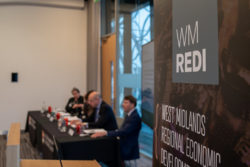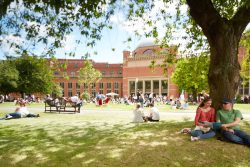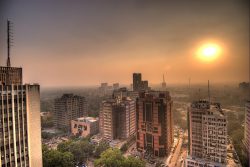Dr Chloe Billing explores what recent funding provided by the government to the University of Birmingham and its partners for space hubs will mean for the West Midlands. “Space is a means to various ends and not an end in itself.” Dr Chloe Billing Fifty-one years after the successful lunar landing by the U.S. Apollo … Continue reading “The West Midlands and Outer Space”
Tag: University of Birmingham
WM REDI Launch Shows the Region Is Ready to Rise to the Challenge
An exciting new University of Birmingham research institute, the West Midlands Regional Economic Development Institute (WM REDI) was launched on Monday 3rd February. It is an unprecedented partnership between key regional organisations and stakeholders, who have come together to find ways to deliver an effective inclusive growth vision and meet the economic challenges and opportunities … Continue reading “WM REDI Launch Shows the Region Is Ready to Rise to the Challenge”
Data for Good. How Has Data Transformed Today’s Social Sciences?
At the beginning was Big Data, then Machine Learning came and now is the time of AI. Since buzzwords emerge faster than the innovation waves they describe, the conceptualization of digital transformation remains sometimes vague, although it can be considered the result of convergence among advances made in several related information and communication technologies (ICTs). … Continue reading “Data for Good. How Has Data Transformed Today’s Social Sciences?”
Enhancing the Civic Role of UK Universities
Two key events in February brought into focus the contribution made by universities to their city-regions. They also highlighted how much more universities could do and how important it was to enhance this contribution in light of current political and public sentiment towards universities in the UK. One was the launch of the report by … Continue reading “Enhancing the Civic Role of UK Universities”
A Bollywood Solution to Air Pollution: Linking Research and Policy to the Cinema Screen
On the 6-7 March 2019, Professor John Bryson participated in a workshop in New Dehli exploring the challenges of urban air pollution. The workshop was co-organised by the University of Birmingham with the Indian Institute of Technology Delhi. Professor Bryson is part of the team working on the ASAP East Africa Project – which aims to provide … Continue reading “A Bollywood Solution to Air Pollution: Linking Research and Policy to the Cinema Screen”
The Invisible Killer and Responsible Inclusive Prosperity: Tackling the Challenges of Urban Air Pollution – Delhi India, 6-7 March 2019
Air pollution is a major global challenge that is responsible for 1 in 10 deaths and has been estimated to cost US$5.1 trillion. Last week I was in New Delhi participating in a workshop to explore the challenges of urban air pollution co-organised by the University of Birmingham with the Indian Institute of Technology Delhi. … Continue reading “The Invisible Killer and Responsible Inclusive Prosperity: Tackling the Challenges of Urban Air Pollution – Delhi India, 6-7 March 2019”
Remembrance Sunday 11 November 2018: From the Great Hall, University of Birmingham, to the Acme Trench Whistle
On 11 November 1918, at 5am, an armistice with Germany was signed in a railway carriage based at Compiègne, France. Thus, concluded the Great War, the war to end all wars or what became known as the First World War. At 11am on 11 November 1918 on “the eleventh hour of the eleventh day of … Continue reading “Remembrance Sunday 11 November 2018: From the Great Hall, University of Birmingham, to the Acme Trench Whistle”
The University of Birmingham’s Impact on the Local Economy
Birmingham was recently ranked as the UK’s number one destination for foreign direct investment – creating over 12,000 jobs in the last 10 years. The West Midlands ranks as the UK’s number one region for manufacturing technology jobs, accounting for 60% of the country’s exports. The focal point for explaining the region’s success often surrounds … Continue reading “The University of Birmingham’s Impact on the Local Economy”








